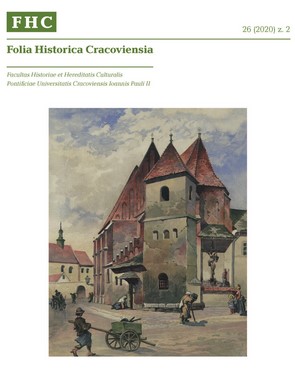Impediti Bishops of the Vilnius Diocese in the Russian Empire Period: A Case of Bishop Adam Stanisław Krasiński
Impediti Bishops of the Vilnius Diocese in the Russian Empire Period: A Case of Bishop Adam Stanisław Krasiński
Author(s): Aldona PrašmantaitėSubject(s): Christian Theology and Religion, History of Church(es), Political history, Government/Political systems, Politics and religion, 19th Century
Published by: Wydawnictwo Naukowe Uniwersytetu Papieskiego Jana Pawła II w Krakowie
Keywords: Vilnius diocese; Bishop Adam Stanisław Krasiński; Russian Empire; impediti bishops;
Summary/Abstract: Following the partition of the Polish-Lithuanian Commonwealth, the Vilnius diocese, together with the Samogitian diocese, found itself under the direct supervision of the Russian Empire. It was the intention of lay authorities that the Catholic Church should be governed according to the same principles as the Orthodox Church, which enjoyed the status of the national church in the Russian Empire. Disobedience frequently became a pretext to remove the disloyal hierarch from power over the diocese. This phenomenon became a real plague in the Vilnius diocese. Under the pretext of disloyalty, lay authorities prevented three bishops ordinary of the Vilnius diocese: Adam Stanisław Krasiński (1863), Karol Hryniewiecki (1885), Eduard von Ropp (1907) from performing their duties, exiling the hierarchs. Based on the literature of the subject and analysis of sources, the article presents the history of the removal of Bishop Krasiński from the episcopal throne. His stance during the January Uprising was a pretext to remove the bishop from the Vilnius diocese. The analysis led to the conclusion that Bishop Krasiński’s stance towards the uprising was in accordance with the statement of the Holy See. However, faced with the requirements of the Russian officials, he did not relent and refused to issue a public circular condemning the uprising. Bishop Krasiński was alien to servile obedience towards imperial authorities. The exile to Vyatka (called Kirov since 1934) in inland Russia was the price he paid for his personal dignity and the dignity of his office of the bishop of the Roman Catholic diocese.
Journal: Folia Historica Cracoviensia
- Issue Year: 26/2020
- Issue No: 2
- Page Range: 69-95
- Page Count: 27
- Language: English

